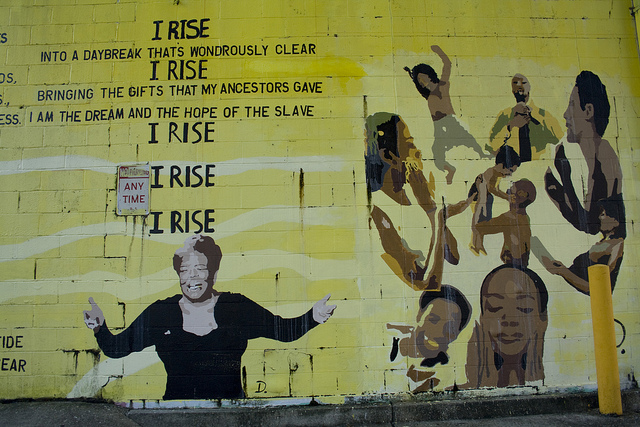
When given the choice between being labeled a racist or an anti-racist, most people I know would choose the latter.
I’ve managed to weed the former out of my social circle over time, either by alienating them with my own viewpoints or by intentionally letting the relationship slip away over the years. What’s left in my social tribe is a group of intelligent and thoughtful people who strive to be on the right side of history and social justice issues, especially racial justice. Oh yes, and they are mostly white. My liberal white friends and I enjoy listening to NPR, drinking smoothies, and watching foreign films, but our favorite pastime is complaining about what we consider backward politics and oppressive dogma.
We hate the haters, and in doing so we feel like we are fighting the good fight.
Yet our fight is cowardly. Our kind of fight is no fight at all, but rather an exercise in the sport of (as my husband likes to say) “armchair quarterbacking.” By continuing to reinforce each other’s beliefs in our own comfortable circles, we’re really not fighting anything at all.
It’s time we move from what experts call reactive social justice toward a more effective means of social change: proactive social justice.
The word “activism” might freak you out. I understand. First of all, you’re already really busy. You serve on the PTA or work at the Student Union, and you volunteer for Meals on Wheels or at the dog shelter. You’re really active about things that matter to you, but not really an “activist” (air quotes added by you). You can’t quite envision yourself with a picket sign. You’re uncomfortable sporting a Black Lives Matter t-shirt or yard sign, and you would be too mortified to knock on doors asking your neighbors to sign a petition. All of these concerns could be attributable to what experts have coined “imposter syndrome,” which occurs when we feel like we don’t belong in a place where we are expected to have credibility and confidence. In this context, the syndrome causes us to engage in what racism researcher Robin DiAngelo calls “White silence.”
One former imposter explains her own syndrome as a barrier to becoming an activist for social justice, writing,
“I have never called myself an activist. To me, activists are very organized, well-spoken (and outspoken), proactive in spreading the messages of their cause, and inspire others to be better. While I do care about social justice, I often find myself struggling with the right response to those who critique social justice movements. I consider myself someone who is constantly trying to learn how to be a better citizen, not necessarily someone who inspires others.”
~ Activist Librarian Annie Pho
These and any number of other feelings can trigger our silence and get in the way of our participation in proactive social justice. I’m here to tell you that we are all experienced enough, we are all needed and if we have time to be active then we have time to be activists.
Here are three simple things we can each do to get our activism on:
Utilize our strengths. Activism takes many forms, and everything counts. Forget the petitions and picket signs. Are you an artist? Create something to display in your home, office, school, webpage, or Facebook wall. Check out this award winning Google Doodle created by a high school sophomore for inspiration.
Are you a writer? Submit an op-ed to your local newspaper or just blog about your thoughts and share the link with friends, asking them to pass it on. If you work with children, add an anti-racist activity or exercise to your curriculum (get ideas from tolerance.org). We’re less likely to feel like imposters when working within our fields of expertise.
Strategize. In situations where you feel like you could or should do more (like remaining silent in response to a racist comment), instead of beating yourself up, reflect on how you could approach it differently next time. Being assertive with friends and family can be harder than confronting a stranger. There is no one formula for telling a loved one that his or her comment sounds racist, reflects privilege or is too stereotypical for your comfort level. Sometimes thinking about it later, analyzing your audience and coming up with of a good way to respond the next time makes you better prepared to “call them in” toward anti-racism rather than “calling them out” as racists. “Calling in instead of calling out” is one of the shared values of Showing Up for Racial Justice (SURJ), a group aimed at eliminating the shame and blame strategies associated with some social justice groups and instead using more invitational strategies to encourage white allyship. It’s a brilliant strategy.
Do one thing each week. If we each commit to one small act every day, or at least every week, then we are part of the solution. This could be learning a fact about black history (register here to receive Black Facts of the Day over email) or sharing one relevant post every time we use social media (find good ones by visiting pages such as White People Challenging Racism). Television watchers can replace one hour of TV each week with a documentary on black history or institutionalized racism (like The Return on PBS, or The Trials of Muhammed Ali on Netflix). The rabbit hole of information available out there is endless, addictive and inspiring.
These three behaviors are just a starting point to help silence the imposter’s voice and exercise activist muscles. As with any exercise regime, getting started is the hardest part.
But who knows, over time the muscles may get strong enough to hold up that picket sign after all.
Author: Carrie Hutchinson
Image: Derek Bridges/Flickr
Editors: Emily Bartran; Catherine Monkman










Read 7 comments and reply